15 Jul 2015 | Azerbaijan, Azerbaijan News, Europe and Central Asia, mobile, News
It should have been a happy day for Leyla and Arif Yunus. On 15 July, the couple — together for 37 years — saw each other for the first time in 11 months. The circumstances of their reunion, however, put a damper on what would otherwise have been a joyous occasion: it took place inside a glass cage, in a cramped courtroom in Baku, Azerbaijan. The human rights activists are on trial, on charges widely recognised to be politically motivated.
Initially scheduled for 13 July, but pushed back for unknown reasons, the Yunus’s pre-trial hearing came almost a year after they were first detained within days of each other in July and August of 2014. Leyla, director of the Peace and Democracy Institute, and Arif, a historian and researcher, have since been accused of an array of crimes, ranging from tax evasion and illegal business activities, to treason.
In the courtroom some 30 places were allocated to members of the public, who were stripped of their phones at the start of proceedings. Representatives from the German and EU embassies, as well as local journalists and NGOs were in attendance, according to Kati Piri, a Dutch member of the European Parliament who travelled to Baku for the trial. She estimated that more than half of the the crowd that had shown up, including other embassy delegations, did not manage to get into the room.
Piri told Index on Censorship that she was there to show support and solidarity for the couple, and that the European Parliament and the international community had not forgotten them and will continue to exert pressure.
“Even though the spotlight is no longer on Baku for the games, it will continue to be on when it comes to human right abuses,” she said, referring to the inaugural European Games, hosted with much fanfare by the Azerbaijani capital just weeks ago.
Proceedings lasted some 2.5 hours, and according to reports from inside the court, both Leyla and Arif looked pale and thinner. Leyla’s struggles with diabetes and Hepatitis C in prison have been well documented, but during the hearing she expressed worry in particular about her husband. Piri said Arif looked “much less strong and vivid than Leyla”. Their daughter Dinara told media in June that both her parents’ health has deteriorated since their arrest.
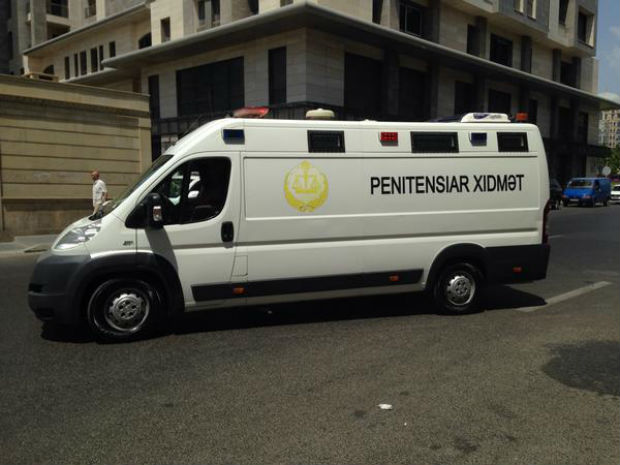
The van transporting Leyla and Arif Yunus (Photo: Kati Piri)
An appeal to the judges to allow Leyla to serve house arrest instead of imprisonment, was denied — as was every other motion filed by the defence, including a call for the case to be dropped altogether and a request that the couple be allowed to sit with their attorneys instead of the in the glass cages.
But Piri said Leyla seemed mentally very strong: “Mentally, they haven’t been able to break her.” Leyla took the opportunity, during a break in proceedings, to address the people in attendance, and according to Contact.az, she refused to stay silent even when the judge ignored her request to speak. “You are depriving me of the right to speak… I know that it is a false trial, but you have to give me an opportunity to speak…” she reportedly said.
The arrest of the couple in July and August 2014, was the first move in a crackdown by the regime of President Ilham Aliyvev, which has seen some of Azerbaijan’s most celebrated critical and independent voices arrested and sentenced on spurious, and frequently suspiciously similar charges, often relating to white-collar crime. Over the past few months, pro-democracy campaigner Rasul Jafarov has been handed down a 6.5 year sentence, while human rights lawyer Intigam Aliyev and journalist Seymur Hezi have been jailed for 7.5 and five years respectively. Award-winning investigative reporter Khadija Ismayilova is due in court on 22 July.
Leyla and Arif Yunus’s next hearing is scheduled for 27 July. While Piri remains hopeful of a positive outcome for the couple, she is afraid “it will not depend on the judges, but on politicians what will happen in this case”.
This article was posted on 15 July 2015 at indexoncensorship.org
9 Jun 2015 | Azerbaijan, Azerbaijan News, Europe and Central Asia, mobile, News
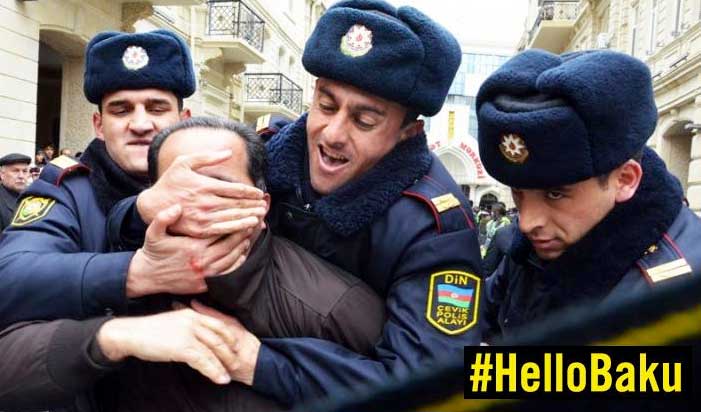
Human rights groups hijacked a hashtag used to promote a contest to win tickets to the opening ceremony of the Baku European Games (Photo: Amnesty International)
President Ilham Aliyev of Azerbaijan has high hopes for the European Games; the brand new, European Olympic Committee-backed regional sporting event which kicks off Friday 12 June in Baku. According to the organising committee BEGOC, Baku 2015 — with an estimated price tag of some £5.4 billion — will “showcase Azerbaijan as a vibrant and modern European nation of great achievement”. But it seems the event is not down to Azerbaijani achievements alone: from promotions to operations, foreign manpower has played a significant role in making Baku 2015 a reality.
Brit Simon Clegg, former chief executive of the British Olympic Association and Ipswich Town football club, is the CEO of the games. He took over when American Jim Scherr, who has previously overseen US Olympic teams, stepped down in 2014. Dimitris Papaioannou, the Greek artistic director of the opening ceremony of the 2004 Athens Olympics, will reprise this role in Baku. Meanwhile, British marketing firm 1000heads was behind a social media competition to give away tickets to the show. James Hadley, Cirque du Soleil’s senior artistic director, will take the reins of the closing ceremony, with the help of creative director Libby Hyland, who previously worked on the Pan American Games. The promo video was directed by American Joel Peissig, signed to the production company of Oscar-nominated filmmaker Ridley Scott. UK/US-based major events company Broadstone is taking care of day-to-day business on the ground, from transport, to human resources, to security. And the list goes on.
Sporting stars have also made their mark even before the start of the games. “Baku 2015” has for months been emblazoned on the shirts of Spanish football giants Atletico Madrid. A number of participants — from British taekwondo athlete Jade Jones, to French rhythmic gymnast Kseniya Moustafaeva, to Serbia’s 3×3 basketball team of Dušan Domović Bulut, Marko Savic, Marko Zdero and Dejan Majstorovic — have been named international athlete ambassadors.
While most contemporary mega sporting events are, to an extent, multinational operations, the situation in Azerbaijan follows a familiar pattern. The oil rich country — ruled by President Aliyev since 2003, when he took over from his father Heydar — has for some time relied on foreign input in its ongoing international rebranding project. Meanwhile, the government has been cracking down on human rights at home.
Take for instance the modernisation and beautification of downtown Baku. The flame towers dominating the skyline were designed by global architecture firm HOK. The in-demand London-based design studio Blue Sky Hospitality has worked on over a dozen restaurants in the city over the past five years. This includes at least five in Port Baku, dubbed the city’s “premier luxury address” by the glossy, internationally distributed magazine edited by the president’s daughter Leyla Aliyeva. Azerbaijan has also worked with foreign public relations companies, such as the Berlin-based Consultum Communications and global firm APCO, with headquarters in Washington. The government even hired former British Prime Minister Tony Blair as an advisor in 2014. According to independent news site Contact.az, the government in 2011 allocated AZN 30,000,000 (£18.7 million) in the state budget to promoting Azerbaijan, though this figure is thought to be an underestimate.
But the push to paint Azerbaijan as a forward-looking state has not translated into progress on the human rights front. Over the past year alone, the country’s most prominent critical voices — including investigative journalist Khadija Ismayilova, human rights activists Leyla and Arif Yunus, human rights lawyer Intigam Aliyev and pro-democracy campaigner Rasul Jafarov — have been jailed on charges widely dismissed as trumped up and politically motivated.
Critics believe the government, with the help of overt foreign PR and the prestige of working with well-known international names, is presenting a sanitised version of Azerbaijan to the world, to whitewash its poor rights record. In other words: the government targets those challenging its representation of Azerbaijan, and the PR blitz in turn masks the crackdown. “We are facing a huge PR and propaganda machine from Azerbaijan supported by oil companies in the west,” Azerbaijani journalist Emin Milli said at an expert panel debate ahead of the games.
“The Aliyev government has used the revenues of the oil and gas fields to finance a stream of grandiose projects — from the Heydar Aliyev Airport, to the Heydar Aliyev Cultural Centre and the European Games. In the realisation of these projects it has hired a number of international corporations. British companies are particularly heavily involved, for example in constructing the airport, designing the centre, and co-ordinating and branding the games,” said James Marriott from the London-based NGO Platform.
Or, as Simon Clegg told The Independent in 2014, British companies “are absolutely at the forefront of winning contracts over here [Azerbaijan] for the successful delivery of the games”.
Platform’s campaigning is focused around BP, the British oil company which has long worked in Azerbaijan and is one of the lead sponsors of the games. “In binding itself so closely to these foreign corporations the Aliyev government is building the international political support that it recognises is so vital, especially as it tries to counter the growing dissent in Azerbaijan,” added Marriott.
Rebecca Vincent coordinates the Sport for Rights campaign, which has worked to raise awareness around the crackdown on government critics in the lead-up to the games. The movement was initiated by Rasul Jafarov before his arrest. Those wanting to raise human rights issues are “fighting this massive army of very well paid PR firms throughout Europe,” said Vincent.
“The Azerbaijani government’s PR has been quite effective. They have been successful in promoting Azerbaijan as this modern, glamorous country. We’re working very hard to show that there is more to the story; that there is a more sinister side,” she added.
According to Azerbaijani journalist Arzu Geybulla, reaction from her countrymen and women to their government’s strategy has been mixed, and dependent on how much information they have. Some are simply preoccupied with putting food on the table and are unaware of the extent of foreign involvement; others, often young and western-educated, know what’s going on, but are reluctant to challenge the status quo directly.
She categorises foreign companies and individuals working in Azerbaijan in a similar way. Some, she says, know nothing about Azerbaijan and are just there to take the opportunity given to them. Others have limited understanding of the state of human rights in the country, and “care very little about imprisoned journalists or beaten bloggers”. The final group, where she places the EOC, is fully aware of situation on the ground, “and yet they’re saying that athletes are coming there to compete, and the crackdown shouldn’t prevent a sports competition taking place”.
Index queried a number of individuals and firms associated with the games.
One person was willing to speak on the condition of anonymity. While stressing that the presence of international staff and companies is business as usual for large sporting events, the source dubbed the situation at the Baku Games “a little bit weird”, especially noting the “big British connection”.
The person said they didn’t know much about Azerbaijan or its political climate when taking on the job, but spoke of their shock upon arriving in the capital. “Baku is like Monaco crashing into Tijuana … it’s one giant set,” they said, dubbing it a city of facades. “It seemed pretty desperate.” Though the source said they would consider speaking out about the situation, they worried about the impact it might have on the locals they worked with.
1000heads, the London-based company behind #HelloBaku (a social media competition which was hijacked by activists to draw attention to human rights and free speech violations in Azerbaijan), told Index they are no longer involved in the games.
As for athlete ambassador Jade Jones, she says she is focusing purely on the sporting side: “We go to different places. Some places are better than others. I’m just going there to do my job and perform.”
Clegg, meanwhile, has stood firm when pressed on human rights concerns: “Look where they’ve come from – decades of Soviet rule and oppression,” he told The Guardian. “You don’t go from there to there overnight. If you do, you end up with chaos and civil disorder.”
This echoes the government narrative, which describes of a country that may not be perfect, but that is on the right track. “Azerbaijan, as a young democracy and dynamically developing country, which demonstrated goodwill in hosting the first Baku Games, deserves appreciation and understanding, too,” a foreign ministry spokesperson told the BBC.
But with the ongoing jailing and judicial harassment of vocal critics of the government being widely labelled an unprecedented crackdown, many disagree with this interpretation. Council of Europe human rights commissioner Nils Muižnieks co-wrote a recent op-ed arguing that human rights cannot be ignored during the games, and encouraging athletes going to Baku to use their platform to speak out. Some seem to have already taken him up on this: German athletes last week called for the release of Azerbaijan’s political prisoners. “Although I do not usually address directly private companies, I can say that I would like to see the business field taking into more consideration human rights related issues which may arise from its activities,” Muižnieks told Index.
On the day of the opening ceremony, Jafarov will be going back to court. With this, Rebecca Vincent says the government has the opportunity to send a message more powerful than the sure to be spectacular show taking place in Baku National Stadium. “I’d remind the Azerbaijani authorities that the best PR would be to stop the human rights crackdown and release the political prisoners,” she said.
“Rasul’s release would be a step in the right direction.”
This article was posted on 9 June 2015 at indexoncensorship.org
16 Mar 2015 | Azerbaijan, Azerbaijan News, Europe and Central Asia, mobile, News
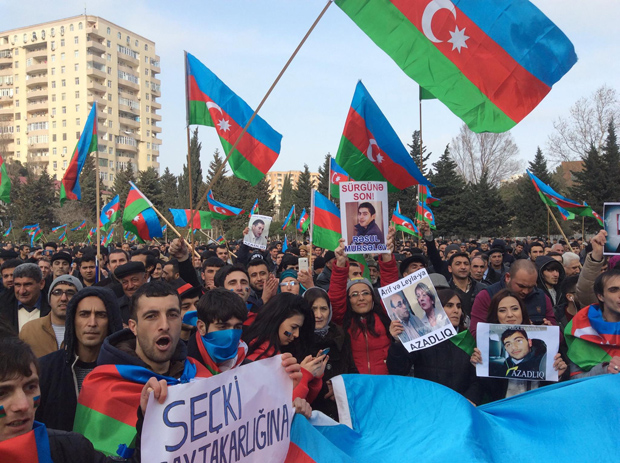
“Stop the plunder! Thieves in power, go! Resign!”
These were just some of the chants from the scores of Azerbaijanis who gathered in Baku’s Mashul stadium on Sunday. The estimated 10,000 strong crowd was protesting the recent devaluation of the country’s currency and its detrimental effects on living standards. Demonstrators also spoke out against human rights abuses in the country, just 87 days before its capital is set to host the inaugural European Games.
In late February, Azerbaijan’s central bank made the choice to devalue the manat around 30% against the dollar and the euro, in response to the recent drop in oil prices. Around 70% of government revenues come from oil exports. But the policy has led to significant price hikes, igniting the public anger which culminated in Sunday’s protest.
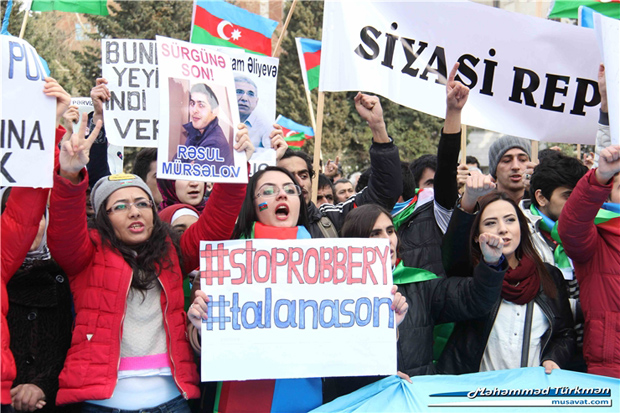
“Ranging from consumer goods, real estate, construction materials, equipment, automotive spare parts, everything is so much more expensive,” stated the official Facebook event, which attracted over 2,400 attendees. The organisers — the oppositional National Council of Democratic Forces (NCDF) — however, put attendance on the day at some 10,000.
The peaceful rally was authorised by the the regime of Ilham Aliyev, who has been in power since succeeding his father Heydar in 2003. In 2013 he won the presidency for a third time, following his 2009 decision to remove term limits, and amid accusations that the vote was not free and fair.
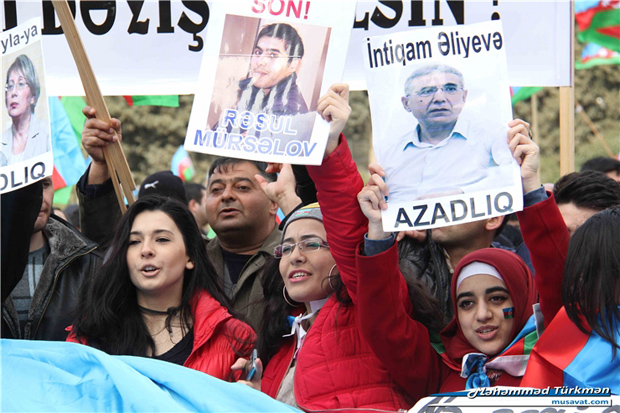
It took place against the backdrop of the countdown to this summer’s International Olympic Committee (IOC)-backed Baku European Games. This fact was not overlooked by protesters. Ali Kerimli, from opposition party Azerbaijan Popular Front, criticised the amount of money spent on the event, saying it could instead be “directed to address the serious social and economic problems, raising the minimum wage and pension, which is only 150 manat,” according to contact.az.
The games have been budgeted at over £5.4 billion, with Simon Clegg, the organising committee CEO (formerly of the British Olympic Association), promising it will be “the most fantastic show ever staged in Azerbaijan”.
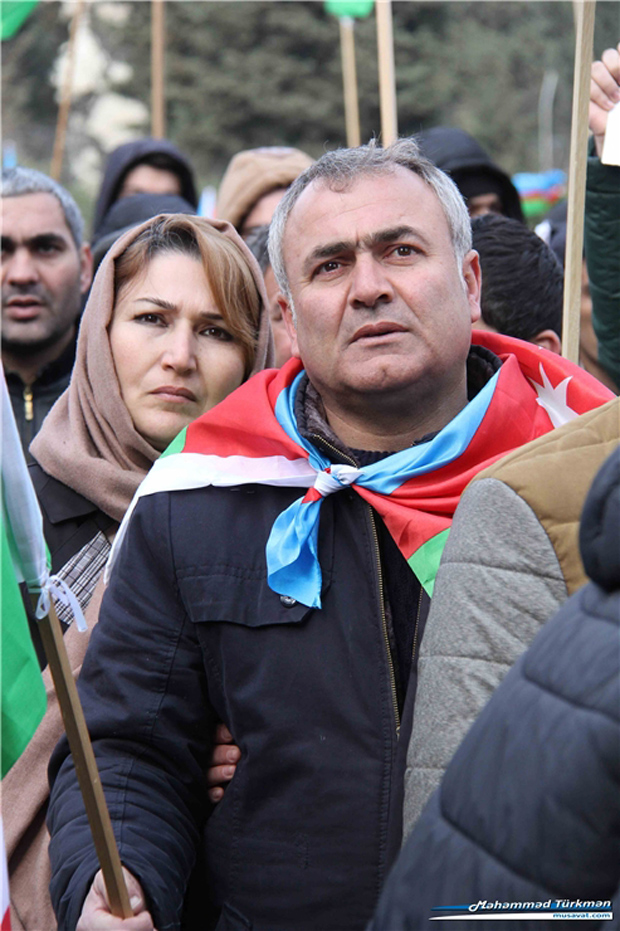
Kerimli also brought up the recent revelation that Azerbaijan will cover the costs of all 50 participating delegations. Such grants, most often connected to travel, have played an increasing part in Olympic bidding processes since they were first used at Sydney 2000. Today, “you cannot win without it”, according to the organising committee chair of this summer’s Pan American Games in Toronto. But as it is understood Azerbaijan was the only country willing to take on the risk of hosting the first ever European Games, it was not competing with anyone. Index contacted the European Olympic Committee (EOC) for documents related to the games, such a bid book detailing a city’s hosting plans, including the budget. We were told that as there is no formalised bidding procedure for the European Games, the only such documents that exists is the host city contract. This, we were told, is private and not available to the public.
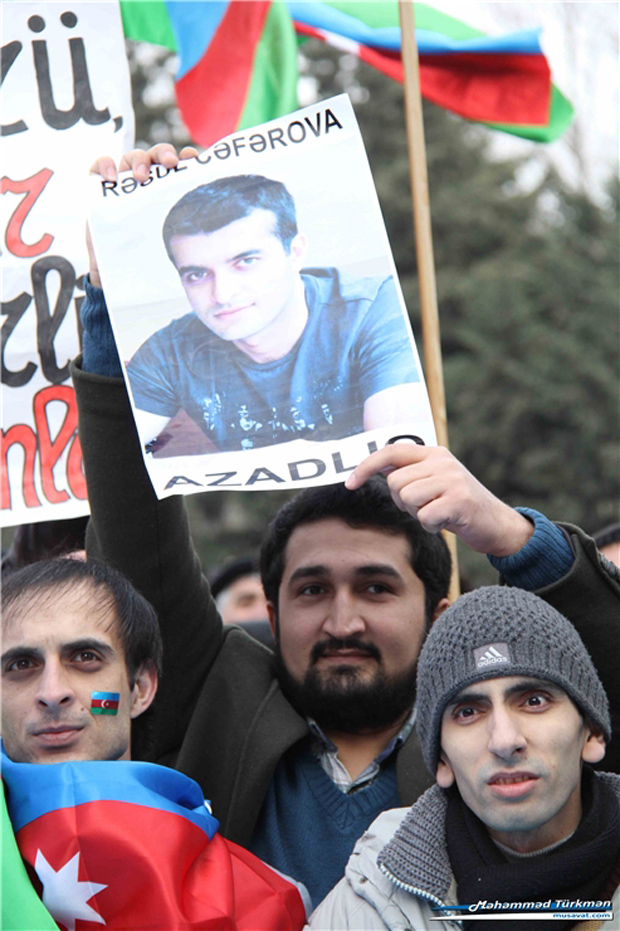
Azerbaijani authorities have been fighting a PR battle on multiple fronts for some time, paying for everything from beautifying Baku, to glossy magazines and international mega-events like the Eurovision Song Contest — with sports playing an increasingly important role.
The most famous example to date is the shirt sponsorship deal with reigning Spanish champions Atletico Madrid. Fernando Torres and his teammates recently started doubling up as miniature Baku 2015 advertising billboards. If nothing else, this will help football fans familiarise themselves with the name by 2020, when the capital will host three group games and one quarter-final of the European Championship. Last September, Azerbaijan also became Manchester United’s “only Official Football Federation and Football Development Partner”. And with two failed Olympic bids behind them, it seems authorities are pinning their hopes on a successful European Games to further boost their credentials among global sports’ biggest players.
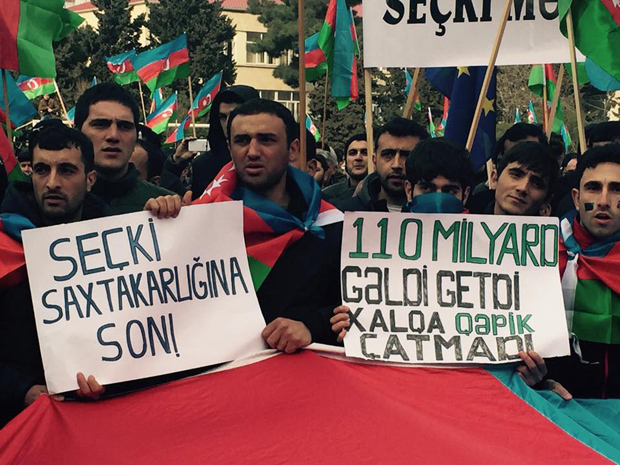
Despite the attempts to rebrand, Azerbaijan has failed to do away with accusations of human rights abuses and high-level corruption. Ranking 126/175 in the latest Transparency International Corruption Perceptions Index, a leaked US diplomatic cable once compared the country to “the feudalism found in Europe during the Middle Ages”.
In fact, some of the corruption claims have gone hand in hand with ambitious projects. Ahead of the 2012 Eurovision Song Contest, journalist Khadija Ismayilova uncovered how the Aliyev family profited from the building of the Baku concert hall where the final was to be hosted.
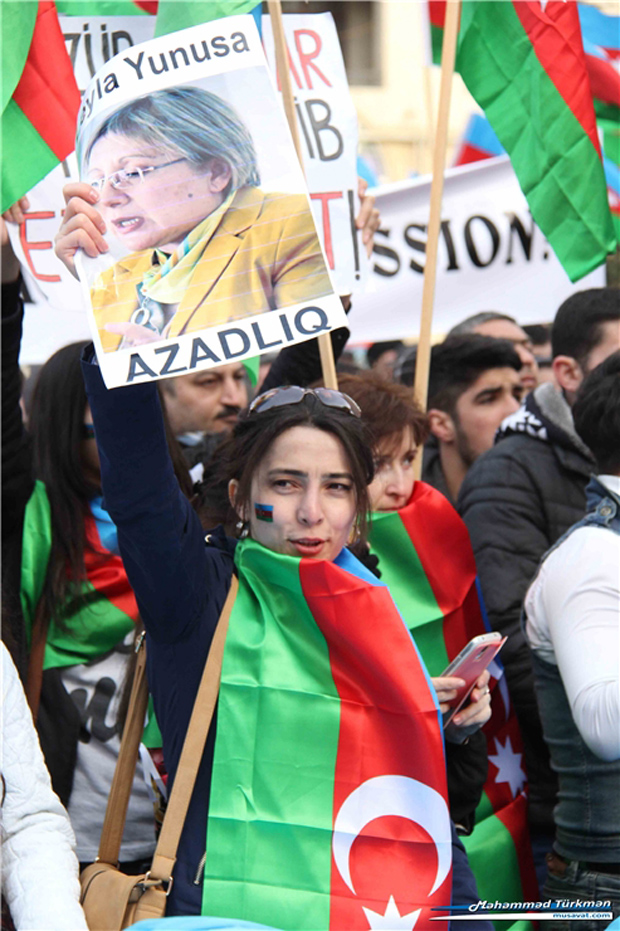
Today, Ismayilova, the country’s most famous and celebrated investigative reporter, is in jail on what is widely believed to be trumped up charges. “I have spent three and a half months in detention waiting for one prosecution, which didn’t work out. Now another one starts. Let us see if prosecutors will produce something smarter than they did so far,” she wrote in an open letter last week.
Just a few months before Ismayilova’s arrest, a number of other prominent government critics — including human rights activists Rasul Jafarov and Leyla and Arif Yunus, lawyer Intigam Aliyev, and journalist Seymour Hezi — were all detained. Though not there in person, they and the other 100 or so political prisoners in Azerbaijan, played a key part in Sunday’s protest; their faces and names adorning posters across the stadium.
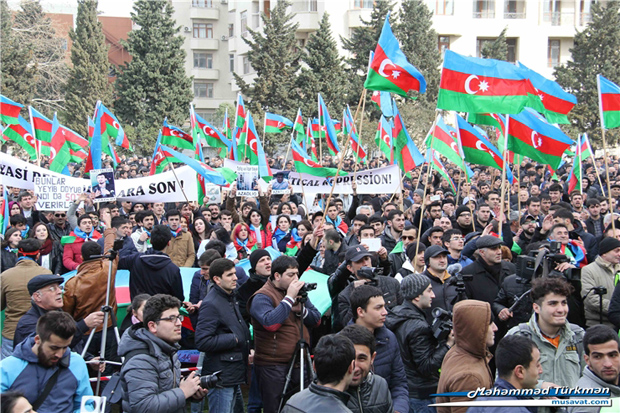
Human rights groups have warned that the European Games, like Eurovision before them, could be used to whitewash these rights abuses, and present a sanitised version of Azerbaijan to the world. With the another protest planned for 5 April, it seems government critics and regular people inside the country are determined to not let that happen.
All photos via Azadliq, reposted with permission.
This article was posted on 16 March 2015 at indexoncensorship.org
22 Sep 2014 | Azerbaijan, Azerbaijan News
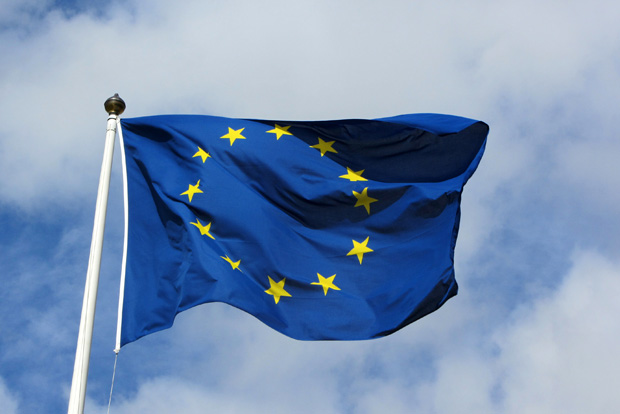
(Image: Håkan Dahström)
The European Parliament has called on Azerbaijan to release several prominent political prisoners and proceed with reforming the country’s human rights policies.
The motion calls for the immediate release of prisoners Leyla and Arif Yunus, Rasul Jafarov, Intigam Aliyev and Hasan Huseynli. It also asks that the government cease its harassment of civil society organisations, opposition politicians and independent journalists.
Leyla and Arif were arrested at the end of July 2014 and are facing a series of charges which include treason and fraud. On 14 July 2014 Hasan was sentenced to six years in prison, Rasul and Intigam were arrested at the beginning of August 2014. There are currently 98 political prisoners in Azerbaijan.
EU support and cooperation with Azerbaijan, including ongoing negotiations for a Strategic Modernisation Partnership, must be conditional upon and include clauses relating to protection of human rights, states the text from the session.











